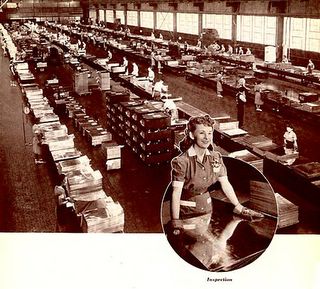prepackaged meat
Wal-Mart offers much to take in. Its face sticks into nearly every US town. Its other appendages snake along paths carved by global capital chessmoves. "Wal-Mart's computer database is second only to the Pentagon's in capacity," says this. If the Bentonville firm were a separate nation, it would be one of China's top 10 trade partners -- amounting to not merely a large, smart and aggressive retailer, but a separate economy. Thanks to the hallowed legal confusion between actual people and corporate persons (choreographed in the 19th century), the goal of the USian corp. is to be its own economy. Separate. Free. On the march. Unlimited upside-cum-zero-societal-obligation. Wham Bam Thank you Uncle Sam.
Wal-Mart's lightning pacifications of unionizing efforts are instructive:
In 2000, meat cutters at a Wal-Mart in Jacksonville, Texas, became the nation's only Wal-Mart workers to vote to unionize. But two weeks later, Wal- Mart announced it was replacing its meat-cutting operations in the South with prepackaged meat.Child!
Here's a Salon analysis of Wal-Mart moolah. Especially appreciated is the characterization of a Wal-Mart press release extolling its comparative payroll largesse:
What we have, then, is a unique rhetorical form: Nonsense recited by someone who is relying on most of his listeners to understand that he is spouting nonsense.(Irresistable aside: One might take issue with the term "unique," given how aptly this describes the rhetorical mode par excellence of Mr. Bush, for example. Much of the fitfulness experienced when within earshot of his voice is accounted for if one knows that his base knows that he knows that they know that everything he publicly avows is USDA adulterated prepackaged meat.)
Wal-Mart has sufficient standing in states like Florida to get preferential treatment from state legislatures, according to Labor Blog, produced by NY-based labor lawyer Nathan Newman:
Last fall, Florida voters overwhelmingly (72%) approved a constitutional amendment increasing the minimum wage by a buck and mandating that any employers breaking the law pay double damages plus legal fees when they violate the law.Newman says the Florida Legislature's interpretation of its own law is motivatedly wrong, and he would appear to know this because, he says, he drafted the provision.
Now the Florida GOP state House leaders want to let violators of the law escape those double damages if they give the money back within 15 days of being notified by employees of the intent to sue.
And there are the workers who voted against unionization after being exposed to, among other things, videos offering Wal-Mart's point of view:
Cody Fields, who earns $8.10 an hour after two years, said that he had originally backed the union "because we need a change" but that the videos had been effective. "It's just a bunch of brainwashing," Mr. Fields said, "but it kind of worked."The standard media model response to anything like this is to declare how Wal-Mart represents the brand-smashing triumph of you and me. We consumers are calling the shots, driving producer/vendors to China, exploiting Chinese labor and forcing the corp. to hold the line on wages, according to corp. bigwigs and maverick commentators like James Surowiecki.
Now what one never hears discussed is, what designed the consumer? What palimpsest of forces produced this creature that, driven like Io by cruel Necessity (the sting of price), nonetheless appears to have limitless appetite and capacity for every minute piece of unnecessary paraphenalia?
The riddle of the oikos, the order of the house, is not so simple as Surowiecki or Frontline or Sam Walton make it out: Producers, middlemen and "consumers" swim in the same large bouillabaisse. (There is no outside of Wealth Bouillabaisse.) Sam Walton, says this,
had been a small-town merchant. And he had seen the future. He had chosen to eat rather than be eaten.Sam's Chinese slave-associates and Uncle Sam's haggard consumers are the same prepackaged protein, consuming and consumed.








